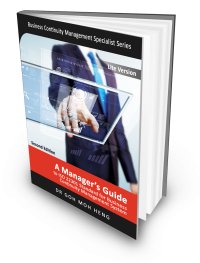BCM Body of Knowledge (BCMBoK)

Body of Knowledge Menu| BoK 1 | BoK 2 | BoK 3 | BoK 4 | BoK 5 | BoK 6 | BoK 7
{{#ev:youtube|G6zveKp4NGE|350}}
{{#ev:youtube|IL-hAkM5vys|350}}

Introduction to BCM BOK
The "A Guide to the Business Continuity Management Body of Knowledge" (BCM BOK Guide) was first published by the BCM Institute as a white paper in 2009 in an attempt to document and standardize generally accepted BCM (CM, CC, DR and OR) definitions and practices.

The BCM Body of Knowledge or BCMBoK is an all-inclusive term that describes the sum of knowledge within the business continuity management profession. Since it is usually not possible to put the entire body of knowledge of even a discipline, such as ISO22301 BCMS audit, business continuity (BC), crisis communication (CC), crisis management (CM), disaster recovery (DR) or operational resilience (OR) , into a single document, there is a need for a Guide to the BCM Body of Knowledge. This Guide will seek to identify and describe that subset of the body of knowledge that is generally accepted, even though the professionals must be knowledgeable not only in BCM Audit, BCM, CC, CM, DR or OR, but also, of course, in other related disciplines. With effect from Jan 2016, Body of Knowledge Zero "0" will not be part of the BCM BoK as the terms in BoK 0 are now re-categorised into BoK 1 to 7, respectively.
Content
This guide contains the seven primary body of knowledge needed for a BCM Audit, BCM, CC, CM, DR or OR professionals. The section below is the table of content for BCM Institute's Business Continuity Management- Body of Knowledge. For example, BCMBoK 1: Project Management defines the project management definitions and knowledge about BCM. The rest of the BCMBok is self-explanatory.


- Note: BCMBoK 0 is not part of the body of knowledge as it provides the fundamentals of ISO22301 BCMS audit, business continuity (BC), crisis communication (CC), crisis management (CM), disaster recovery (DR) or operational resilience (OR).
Competency Level
Each BoK is further divided into three level of competency. They are the foundation (leading to "Planner" certification), intermediate (leading to "Specialist" certification) and advanced (leading to "Expert" certification). The only exception is the BCM Audit course which starts from intermediate (leading to "Auditor" certification) and advanced (leading to "Lead Auditor" certification).
Certification Menu | BCCP | CMCP | CCCP | DRCP | ORCP | BCCS | CCCS | CMCS | DRCS | ORCS | BCCE | CMCE | CCCE | DRCE | ORCE | BCCA | BCCLA
Competency Level Menu
| CL 1B | CL 2B | CL 3B | CL 1C | CL 2C | CL 3C | CL 1CC | CL 2CC | CL 3CC | CL 1D | CL 2D | CL 3D | CL 1OR | CL 2OR | CL 3OR | CL 2A | CL 3A
Body of Knowledge Menu| BoK 1 | BoK 2 | BoK 3 | BoK 4 | BoK 5 | BoK 6 | BoK 7
Level of Expertise Menu | KNOW | DO | MANAGE
(Source: Business Continuity Management Institute - BCM Institute)

